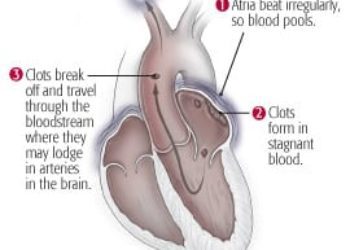Secondary Antibiotic Prophylaxis Reduces Rheumatic Heart Disease Progression
1. In patients with latent rheumatic heart disease, secondary antibiotic prophylaxis reduced the risk of rheumatic heart disease progression.
2. Secondary antibiotic prophylaxis did not significantly reduce the risk of rheumatic heart disease regression.
Evidence Rating Level: 1 (Excellent)
Study Rundown: Rheumatic heart disease is a chronic valvular heart disease that affects more than 40.5 million people worldwide and causes approximately 306,000 deaths annually. Secondary antibiotic prophylaxis with intramuscular penicillin G benzathine is used in the management of rheumatic fever, but there is a gap in knowledge as to understanding its effectiveness in improving outcomes for children and adolescents with latent rheumatic heart disease, especially in low-resource settings. This study found that secondary antibiotic prophylaxis provided a significantly reduced risk of rheumatic heart disease progression. This study was limited by lack of applicability to a real-world setting such as lack of retention in care, availability of medication, social stigma, and limited understanding of the disease. Nevertheless, these study’s findings are significant, as they demonstrate that secondary antibiotic prophylaxis significantly reduced the risk of latent rheumatic heart disease progression in children and adolescents.
Click to read the study in NEJM
Relevant Reading: Native-Valve Infective Endocarditis
In-Depth [randomized control trial]: This randomized control trial included 799 patients age 5 to 17 years from the Gulu District of Uganda, with 399 in the prophylaxis group and 400 in the control group. Patients with a new diagnosis of latent rheumatic heart disease were eligible. Patients who had moderate or severe disease, prior history of rheumatic fever or structural heart disease, or who had known penicillin allergy were excluded from the study. Patients in the prophylaxis group received IM penicillin G benzathine every 4 weeks for 2 years, while participants in the control group received no prophylaxis and no placebo. The primary outcome measured was the echocardiographic progression of latent rheumatic heart disease at 2 years. Outcomes in the primary analysis were assessed via the 2012 World Heart Federation criteria and a four-member consensus panel evaluated and classified the echocardiograms, with a generalized linear model with an identity link and binomial distribution conducted for statistical analysis. Between the two treatment groups, 3 participants (0.8%) receiving antibiotic prophylaxis demonstrated echocardiographic progression at 2 years, as compared with 33 (8.2%) in the control group (risk difference, −7.5%; 95% confidence interval [CI], −10.2 to −4.7). Regarding disease regression, 195 participants (48.9%) receiving antibiotic prophylaxis 191 participants (47.8%) in the control group had echocardiographic regression of latent rheumatic heart disease at 2 years (risk difference, 1.5%; 95% CI, −5.4 to 8.4). Overall, this study demonstrated that secondary antibiotic prophylaxis significantly reduced the risk of latent rheumatic heart disease progression in children and adolescents.
Image: PD
©2022 2 Minute Medicine, Inc. All rights reserved. No works may be reproduced without expressed written consent from 2 Minute Medicine, Inc. Inquire about licensing here. No article should be construed as medical advice and is not intended as such by the authors or by 2 Minute Medicine, Inc.


![PFO closure equivalent to medical management in prevention of recurrent stroke [PC and RESPECT trials]](https://www.2minutemedicine.com/wp-content/uploads/2013/03/Echokardiogram_von_Atriumseptumdefekt_Ostium_secundum1-350x250.jpg)



